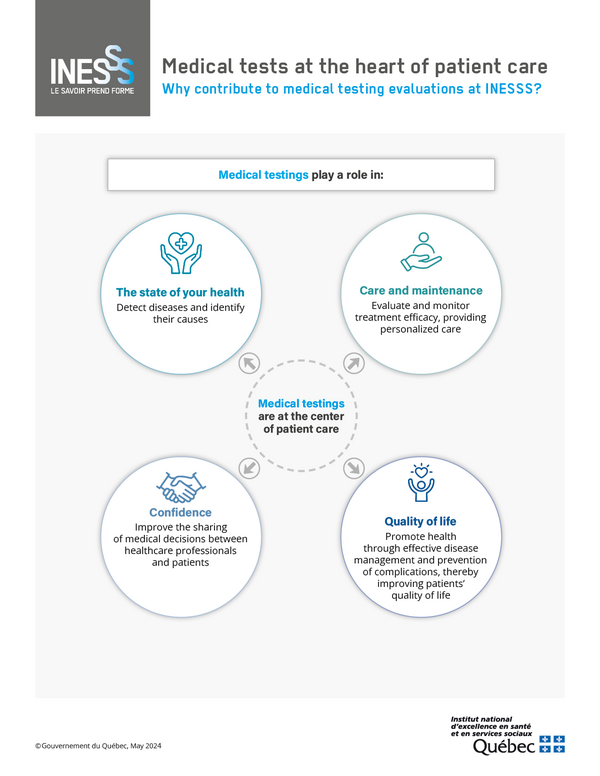Why and How to Contribute
Why contribute?
In order to support the formulation of fair and reasonable recommendations, the Direction de l'évaluation des médicaments et des technologies à des fins de remboursement (DER) of INESSS mobilizes published data, data from care and service environments, such as clinical-administrative data, as well as the knowledge and experience of those involved, whether professional staff and network managers, or patients, users and caregivers.
This information helps us to judge the value of a test, whether it's a diagnostic, prognostic, therapeutic follow-up or screening test, or a companion test linked to the administration of a drug, among others.
Test use is assessed along five dimensions:
Who Can Contribute?
All health service users, sufferers, caregivers, patient associations and groups can contribute to the assessment process.
How can I contribute?
There are two ways of contributing to the evaluations:
- It is possible to fill in a test consultation questionnaire by consulting the test work plan currently being evaluated.
- You can take part in a consultation (interview or focus group) by responding to a call for applications published on the INESSS social networks and in the INESSS Express electronic newsletter.
Test involved
The Direction de l'évaluation des médicaments et des technologies à des fins de remboursement (DER) conducts evaluation work leading to recommendations regarding the relevance of maintaining or adding a test to the Répertoire québécois et système de mesure des procédures de biologie médicale of the Ministère de la Santé et des Services sociaux (MSSS). These recommendations, submitted to the Minister of Health, are published.
You can find the tests evaluated by the INESSS on the Tests under evaluation page.
What innovations are associated with a comment period?
A comment period is open for all types of projects: new tests, tests already reimbursed but covering new uses, or re-evaluated tests.The absence of a comment deadline indicates that the consultation period is over.
Here's an example of a project in which patients contributed to test evaluation by sharing their experience and perspective:
Guided by patient needs: The INESSS's approach to a more inclusive evaluation of medical tests Women with a different Rhesus factor from their fetus may develop antibodies against it. This can lead to hemolytic disease of the fetus and newborn. This disease causes a range of problems, from mild anemia to death of the fetus or newborn. Pregnant women were offered preventive injections to prevent their immune system from reacting against their child. The INESSS's mandate was therefore to assess the relevance of using a genotyping test based on a simple blood sample taken from the mother, in order to avoid the administration of unnecessary treatments. The project team met 2 women who had recently given birth in individual consultations and collected questionnaires from 40 pregnant women or women who had recently given birth. Gathering the women's experiences of the test enabled us to assess their satisfaction with their care, as well as their concerns and those the people around them. The consultation highlighted how important it is for women to be well informed, so that they can make an informed choice, according to their values and preferences. In fact, the women's point of view helped us to understand how the test can improve their care, reassuring them about their health status and the safety of their unborn child. By incorporating these women's experiences and experiences into the INESSS’s evaluation work, members of the Comité délibératif permanent - Approches diagnostiques et dépistage were able to make more informed decisions, more focused on the needs of patients living in Quebec. If you would like to know more about this consultation, you can find all the information in the notice. |
If you have any questions about the consultation process for tests evaluated for introductory purposes, please contact our team at biologie-medicale.genomique@inesss.qc.ca.



